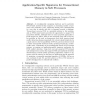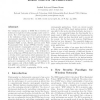354 search results - page 27 / 71 » Sorting networks on FPGAs |
EELC
2006
14 years 2 months ago
2006
We present a neural-competitive learning model of language evolution in which several symbol sequences compete to signify a given propositional meaning. Both symbol sequences and p...
ARC
2010
Springer
14 years 2 months ago
2010
Springer
As reconfigurable computing hardware and in particular FPGA-based systems-on-chip comprise an increasing number of processor and accelerator cores, supporting sharing and synchroni...
IJNSEC
2007
13 years 11 months ago
2007
The widespread adoption of IEEE 802.11 wireless networks has brought its security paradigm under active research. One of the important research areas in this field is the realiza...
CISIS
2011
IEEE
12 years 11 months ago
2011
IEEE
—Computational performance increasingly depends on parallelism, and many systems rely on heterogeneous resources such as GPUs and FPGAs to accelerate computationally intensive ap...
FPGA
2006
ACM
14 years 2 months ago
2006
ACM
This paper examines the tradeoffs between flexibility, area, and power dissipation of programmable clock networks for FieldProgrammable Gate Arrays (FPGA's). The paper begins...


